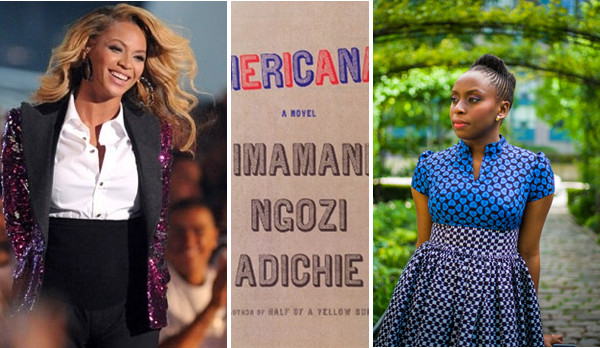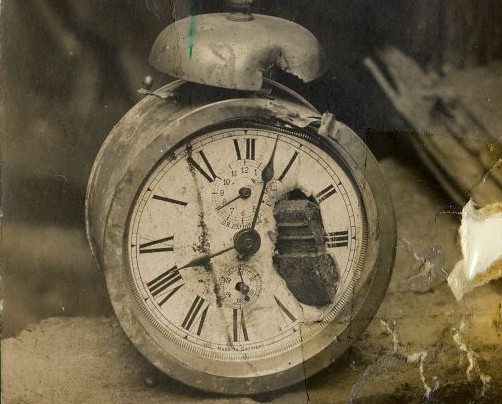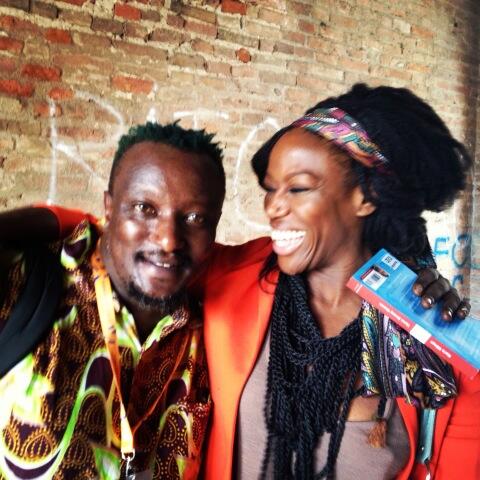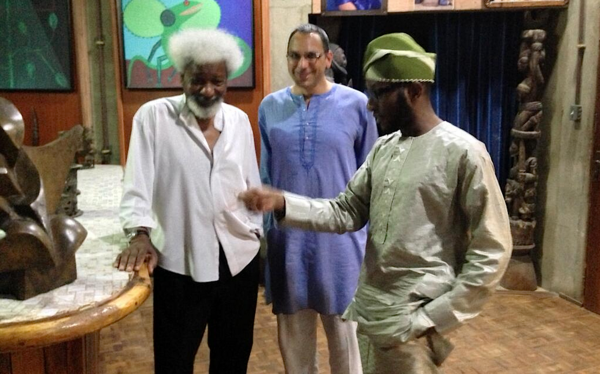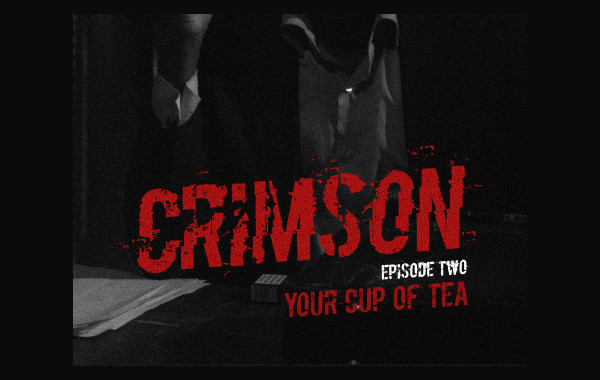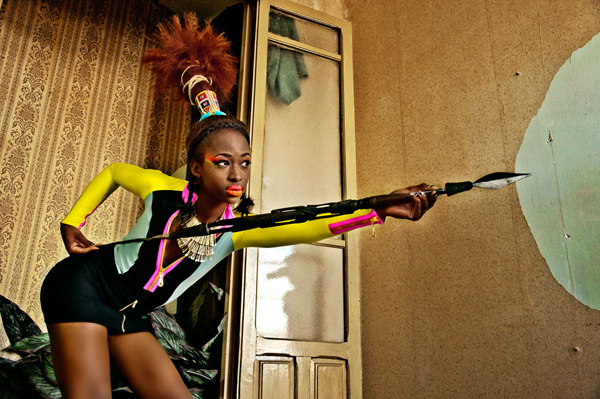![]()
What does a butterfly and a penis have to do with God, the universe, and the secrets of creation? Perhaps the Bible and quantum mechanics, Satan and Pythagoras, time and the tarantula aren’t such different things. Perhaps when brought in relation they hold the key to the power of poetry.
The Testament of Sand by Nigerian poet, Umar Sidi, explores these quirky and titillating ideas. In 290 lines of poetry that enchants the open-hearted reader, Sidi explores the thread that runs through the cosmos from man to God and back.
Testaments of Sand is that weird moment when prayer and invocation slips into an erotic love song. Braze yourself because the poem will take you through winding pathways of ideas about time, history, the body, and divinity.
Warning: DO NOT read this poem like a textbook, meaning don’t try to figure it out. Imagine a question that has lost its answer or a puzzle that has lost its key. If you trying to figure it out, the poem will close itself to you and you’ll leave it having gained nothing. If it’s a only word here, an image there, or a sound, a sentence that speaks to you, hold on to it.
I am so pleased to begin the year with Umar Sidi’s Testaments of Sand.
![SID EL HOUARI WAHRAN 1]()
Testaments of Sand (Genesis or Book of God)
*
Al- Arshad poet of sand
Al- Arshad poet of dust
Al -Arshad poet of the testaments
AL – AR – SHAD poet of mud
*
Al- ARSHAD poet of sand
poet of the ocean of sand
where sand particles are consumed
like fine grains of milk
Al- ARSHAD poet of dust
poet of the waterfalls of dust
poet of the expanding worlds which are swirling
over infinite space as floating quarks of dust
Al -ARSHAD poet of the testaments
the Tall tambourine of the family of drums
the accursed poet, the black sheep,
a tarantula, who testified against the tentacles of time
AL – A R S H A D poet of mud;
they said you were there when God moulded mud to make man in the image of Man
they said you were there when God breathed into Man the immortal Breath of God
they said it was you who scribbled the destiny of Man on the bare Soul of Life
they said it was you who implanted the Fall in the Scroll of Life, as metaphor for twist of fate
they said you are Eve, or the aromatic curves of Eve
Some said you are the vituperative fangs of the Serpent
Some said No! You are the bushy valley of life, the forbidden fruit tucked between the mighty thighs of Eve
they said it was You who created mythos to distract Man from deciphering the original face of God hidden behind palisades of clouds
they said it was You who carved out logos from the left ear of God
they said it was You who created the alphabet and encrypted it with metaphors
![SID EL HOUARI WAHRAN 2]()
and when God said let there be light, You were there, as the Form of the photon,
the tiniest quark of dust
and when God peeped into the void, You were there as the shadow of darkness
omnipresent in the nothingness of things
and when God said let the universe be, You were there as the big that banged, the bang
that bigged
and when God said let us shape the destiny of Man, You were there as the pen and
the scroll, the scribbles and the scribe
A L – A R S H A D poet of many colors
- the purple mare of paradise
- the chlorophyll in the garden of red
- the red arakarabura
- the yellow hissing flames of hell
A L - A R S H A D
the many seasons of songs:
To the Angels
You are the Serpent, the venomous viper filled with bile
To Eve
You are the blessed rod, the pathway to endless bliss,
the monstrous delicious member of Man
To Man
You are vinegar, the white water, crystal drops
the sacred elixir of lust
To Words
You are the emptiness between the letters,
the very gap separating E & O, V & L
to words, You are the neutrinos, the photons, protons of language,
the central atom of speech
To God
YOU ARE THE FORCE
always the FORCE
the pestle that stirred the cosmic soup
when God said LET’S MAKE LIFE
A L – A
R
S
A
H
D - poet of dust
You are A L – A R S H A D poet of dust
the ? that begets question
the lofty permanence absent from the fields
the codex
the invisible secret
the custodians of codes?
al-arshad ? What is the meaning of A L – A R S H A D? :
ALIF: The letter of sand, the invisible
time keeper of the cosmic clock
LAM: The letter of Ram, the sacrificial shards of meat
blood and veins slain at the base of mount arafat,
the clinical tree which extends to heaven to strangulate the jugular of God
AYN: The consonant of light, the eastern duck
that flaps the wings of emerald, the Butterfly,
the Unicorn, the nebula of the horse; the ancient
labor room of stars
RA: dust. The consonant of dust. The brown gazelle gazing
at (mim) the island of frogs & the constellation of Ba
SIN: Sack. The alphabet of the cordage. Strands. Web.
The stellar net, the escape point of earth, Saturn, Pluto & Mars
from the barricading sheets circling the dungeon of God
HA: Heat. The letter of Heat.
Al HamZa :
The letter of light (at the very beginning),
the pointed beak of the paragon of birds,
the bright blackness of the black Madonna, the luminous bulbs
atop the forecastle of the Tall Ships of Sand
Da: t h e D a r k
l e t t e r
Da. The thick black bush of the intercrural valley
Da. The scent. That scent. Cunt. Fuck.
AL – ARSHAD who witnessed the wedding
between sky and God?
Angels? Satan? Black holes? The stars?
Al- ARSHAD - poet of light where can we find the
rare ring of GOD?
is it on his thumb in the arch-horn of Leo
far in the seventy seventh realm?
is it on his magisterial seat in the black hole of miria
where the sacred sound: Om, Om, Om Om is being
continuously fertilized?
is it in the Circular Zone of Flames at the wormhole tak
or is it a string floating in cosmic (un)consciousness or
is it lying flat on al-arsh, the inscrutable throne of God?
AL- ARSHAD did God impregnate the sky to give birth to the universe and dhuljoom?
AL-ARSHAD did the universe impregnate space to give birth to planets and stars?
AL-ARSHAD did the earth impregnate the ocean to give birth to Dinosaurs and Djinns?
AL-ARSHAD did the Dinosaurs impregnate dust to give birth to grass, the green gorilla,
genomes and genes?
AL-ARSHAD how did God impregnate the Sky
if Andromeda is the clean cleavage, and dhuljoom the navel &
milky way the intercrural valley, the garden of the thick black forest,
where the holy apple is grown?
AL-ARSHAD is it the original sin for the phallus to veer through
the intercrural valley, the thick black forest, to seek & taste
the holy apple of life?
*
AL-ARSHAD
how did God mate with Sky
is it with droplets of words, did he say BE and Sky CAME?
and when God said LET THERE BE LIGHT,
and there was light, was that an affectionate smile
from a love struck couple longing for a kiss?
or did God use the Omniscient Force
the ungraspable power of thought?
AL-ARSHAD
To Vandals, inhabitants of Androgassos
You painted the face of God
To Zoks citizens of Kazok, the belt of rocks,
You can perceive the fluorescence of God
To Zelinians of ZHUL
You hold the key to the gallery of truth,
where the invisible portrait of God is kept
AL- ARSHAD
is God the big old man with silver beard smiling in the sky?
is God the Integer, the perfect number of Pythagoras and his ilk?
is God the invisible energy of Socrates & the unmoved mover of Plato?
is God the Lord of the Kaaba, and did he instruct the Bedouins to kill, to cast sacred
stones against his arch enemy iblis?
is God the solar disc of the Aztecs
the Osiris of Egypt &
the total Force of the old African sage?
AL-ARSHAD is God the One, the Oneness of the mystic,
the unity of oneness & the whirling dance of a dervish in a lodge?
A L - A R S H A D
——————————————————————–
The accompanying images are quite remarkable. They are the work of Algerian artist Sid El Houari, Wahran. You can find his work HERE.
Umar Abubakar Sidi lives in Lagos. “Testament of Sand” is part of a longer work being published by Saraba Magazine. Sidi also has a collection of poem titled “Striking the Strings” that will be released by Origami ( Parresia) sometime this year.


